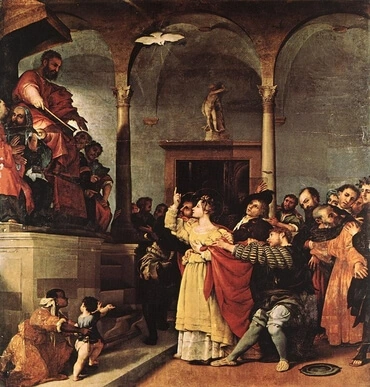Deuteronomio 16:7
To many Protestant and Evangelical Italians, the Bibles translated by Giovanni Diodati are an important part of their history. Diodati’s first Italian Bible edition was printed in 1607, and his second in 1641. He died in 1649. Throughout the 1800s two editions of Diodati’s text were printed by the British Foreign Bible Society. This is the more recent 1894 edition, translated by Claudiana.
Giudice

È facile vedere la connessione tra il giudicare e la verità. In un tribunale, lo scopo del giudice è quello di trovare la verità. In una partita di tennis o di pallavolo, contiamo sui giudici di linea per dire se una palla è finita dentro o fuori. Nel pattinaggio artistico, guardiamo ai giudici per offrire opinioni imparziali di esperti. E in termini più comuni, ogni volta che qualcuno giudica qualcosa, speriamo che sia sulla base della verità.
Non c'è da meravigliarsi, quindi, che il giudicare e il giudizio nella Bibbia rappresentino la verità messa all'opera. A seconda delle circostanze, giudicare può essere insegnare la verità, determinare il carattere di qualcuno dalla verità o mettere ordine nelle cose secondo verità.
C'è un colpo di scena, però - quando ci si riferisce al Signore come giudice, in realtà significa Bene Divino, piuttosto che Verità Divina. Questo perché il Signore ci giudica in ultima analisi dall'amore, e la sua verità scaturisce da questo amore.
(Odkazy: Apocalisse Spiegata 1200; Arcana Coelestia 2231, 2235, 2258, 2372, 3921, 6397 [1-2], 6766, 7206, 8685, 8694, 8728, 8972, 9047, 9857)
Arcana Coelestia # 6766
6766. 'And he said, Who set you up as a man-prince and a judge over us?' means a perception that he was not yet so advanced into the truths of the Church 1 that he could settle disagreements within the Church. This is clear from the meaning of 'he said' as a perception, dealt with often; from the meaning of 'a man-prince' as one who has a command of primary truths, thus who is more enlightened than others in teachings about the truth (for that is what was meant in the representative Church by 'a prince') and therefore 'who set you up as a man-prince?' means that he was not yet so advanced into the truths of the Church (for the meaning of 'prince' as those who have a command of primary truths, see 5044); and from the meaning of 'a judge' as one who settles disputes or disagreements. Here they are disagreements within the Church because it is a quarrel between 'two Hebrew men', by whom those belonging to the Church are meant.
[2] In the highest sense the subject has been the beginnings of the law of God within the Lord's Human; and now it is the development of that law. But in the internal sense the subject here is the development of Divine Truth as it exists with the person who is being regenerated. Its development is such that at first the person can distinguish falsity from truth, for the truth he has enables him to see falsity since it is the opposite of the truth. But he cannot at that early stage settle between one truth of faith and another within the Church. To be able to do this he must make further advances; for a person's enlightenment increases gradually. This is clearly recognizable from those who are in adolescent years and at the start of manhood. They think that the teachings of their Church are the absolute truth, and these they use to distinguish falsities. But they are not yet able to reconcile matters of faith within the Church when these disagree with one another; that ability comes in a sequence of stages. This being so, the person to whom that ability can be given must also be someone who is rather more mature in years, someone in whom the more internal levels of the understanding have been enlightened.
Poznámky pod čarou:






